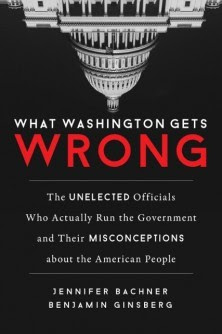The findings by political scientists
Jennifer Bachner and Benjamin Ginsberg, will appear in the book, What Washington Gets Wrong: The Unelected Officials Who
Actually Run the Government and Their Misconceptions about the American People,
which will be published by Penguin Random House on Oct. 4.
“This disdain for the public results
from the wide gulf between the life experiences of ordinary Americans and the
denizens of official Washington,” the authors say.
“Official Washington is wealthier, whiter and
better educated than ordinary citizens. It lives in its own inside-the-Beltway
bubble, where Washingtonians converse with one another and rarely interact on
an intellectual plane with Americans at large.”
In their 2013 survey, the authors
found people who either work in government or directly with it not only have
very little in common with other Americans, but have a disturbingly low opinion
of them.
They found 73 percent of government
officials think the public knows little or nothing about programs aimed at
helping the poor, 71 percent think the public knows little or nothing about
science and technology policy, and 61 percent think the public knows almost
nothing about childcare.
In fact, when it comes to
fundamental policy areas like social security, public schools, crime, defense
and the environment, it was hard to find government officials who thought the
public knew “a great deal.”
Assuming Americans know so little,
government officials tend to use their own judgment rather than the people’s
when making policy decisions, the authors conclude.
With issues of science and defense,
more than half of officials think they should “always” or “mostly” heed their
own opinions. With crime, welfare and the environment, at least 42 percent of
officials felt the same way.
Government officials actually tended
to believe their own views diverged more from those of ordinary Americans than
they actually did.
For example, 76 percent of officials
believe they disagree with average Americans on half of the policy areas
surveyed, but only 12 percent of them really do. The data on “average
Americans” is largely drawn from the 2012 American National Election Study.
“This sense of “false uniqueness”
reflects a sense of cultural or intellectual superiority,” the authors say.
“The officials tend to view the citizenry with a considerable amount of
disdain.”
Previously released findings from the book showed:
--Ninety-one percent of those who
work for federal agencies are white, versus 78 percent of the public.
--In 2012, federal workers
compensation averaged $81,704, or 48 percent more than the private sector
average of $54,995, according to the U.S. Bureau of Economic Analysis. That
puts federal workers in the top 10 percent of American earners.
--Sixty percent of those who work on
the Hill are Democrats versus 35 percent of Americans at large.
--In the 2012 presidential election,
97 percent of congressional and White House staffers voted versus 80 percent of
other Americans. Sixty-two percent of those Hill staffers believe election
votes are counted fairly “very often” compared with 33 percent of other
Americans.
--Washingtonians are reading the
news at least five days a week compared with about three days a week for the
rest of the country.
Bachner is director of the Master of Science in
Government Analytics program at Johns Hopkins. She teaches courses in
statistical analysis, survey research, public opinion, elections and American
political behavior. Her research examines coalition building in Congress,
government responsiveness and the growth of online education.
Ginsberg is the David Bernstein Professor of Political
Science and chairman of the Johns Hopkins Center for Advanced Governmental
Studies. His research interests include American politics, Jewish history,
higher education policy, and the societal impact of war and violence. He is the
author of 24 books, most recently The Worth of War.

No comments:
Post a Comment